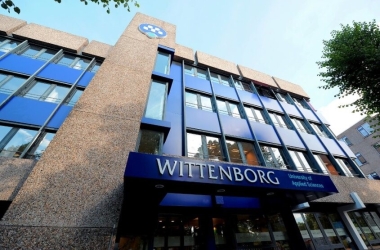Wittenborg Online News!
Looking to the Future: Wittenborg’s Expansion Plans Aligned with Apeldoorn’s Goals
Looking to the Future: Wittenborg’s Expansion Plans Aligned with Apeldoorn’s Goals
Looking to the Future Wittenborg’s Expansion Plans Aligned with Apeldoorn’s Goals

School Plans to Build Cutting-Edge Campus Within City’s Future ‘Learning District’
Wittenborg has taken the first steps towards developing a new, cutting-edge, expanded and sustainable campus near Apeldoorn’s railway station, just opposite the current Spoorstraat Building. The school is working to reach a consensus shortly on the project with the land's current owner, a construction company.
With construction planned to take place between 2025 and 2027, the 6,000 m2 campus is currently at the design stage. It will be multifunctional, including all facilities for the school as well as student accommodation, workspaces for start-ups and scale-ups, a short-stay facility and available spaces for social initiatives.
The project embodies values such as sustainability, innovation and community-centric design. Key features include a zero-emissions framework, circular economy principles, versatile accommodation and a focus on being a cultural and community hub.
In addition to being aligned with Wittenborg’s expansion plans, this initiative shows the school’s commitment to contributing to the growth and development of Apeldoorn. The new campus will be located at the heart of Apeldoorn’s ‘Learning District’, an area located in the Veldhuis neighbourhood, which will be completely revitalised by the municipality.
Besides Wittenborg, the idea is that other educational institutions, companies and organisations based in the city will have their facilities in this region. Approximately 175 student accommodations are planned there, out of the 600 that Apeldoorn intends to build by 2030, in different areas of the city. By implementing the ‘Learning District’, one of the municipality’s goals is to attract more young students to live in Apeldoorn, which would positively impact the city's age structure and boost the local economy.
Wittenborg president Peter Birdsall highlights that the new campus will play a critical role in enabling the school to expand from 1,500 to 2,500 enrolled students by 2030. “Once we’ve got the new campus, we will maintain our Spoorstraat location because it’s an iconic building, tied to the history of Apeldoorn, but it will probably have a different use then. As for the Brinklaan building, our plan is to convert it into a student housing facility after we move out, so that we can provide even more quality accommodation options for our students.”
According to Birdsall, the fact that students from various institutions will be living and studying in close proximity will be beneficial for them and for the city, helping to promote integration between Dutch and international citizens. He points out that the ‘Learning District’ aims to create as much housing as possible, addressing one of the main issues faced by Apeldoorn and other Dutch municipalities.
“The concept is that the housing will be part of a district, comprising a combination of social services and education. This means that you're not separating university or college campuses from the living environment. With this, you can have students, residents, education institutions, small companies and social facilities all within the same area. Other Dutch cities are undertaking similar initiatives and they need to do so, because this integration is crucial for the future of the country.”
Wittenborg CEO Maggie Feng stresses that, by working on the implementation of the ‘Learning District’, Apeldoorn is striving to become a more international, dynamic and developed city.
“This area of Apeldoorn is not the city’s most attractive neighbourhood at the moment, and it does need rejuvenation. So, it's a really great opportunity to modernise that part of Apeldoorn and help make it a much more attractive city to live in. On top of that, by providing more international students with the conditions to study and live here, we will be attracting more talent. This will meet the needs of Dutch industry and market and stimulate economic growth,” she comments.
WUP 14/12/2023
by Ulisses Sawczuk
©WUAS Press
647 words